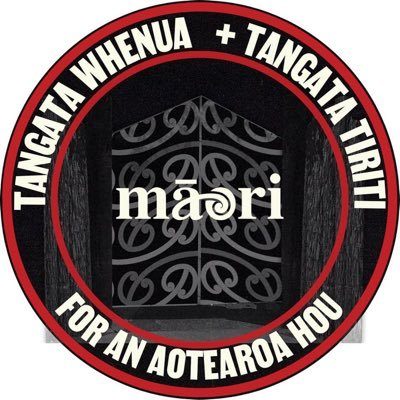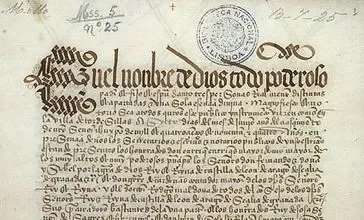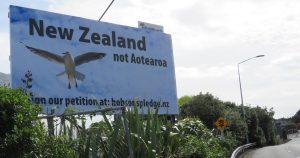The Doctrine of Discovery (also known as the Doctrine of Christian Discovery) is an international legal concept and Christian principle, that is borne out a number of catholic laws (called “papal bulls”) originating out of the Vatican in the 15th and 16th centuries. It gave the monarchies of Britain and Europe the right to conquer and claim lands, and to convert or kill the native inhabitants of those lands.
In 2019 it will be 250 years since this process was carried out in Aotearoa New Zealand, by James Cook. Here are 5 important things to know about that:
- The intent of the Doctrine
The Doctrine of Discovery provided a framework for Christian explorers, in the name of their King or Queen, to lay claim to territories uninhabited by Christians. If the lands were vacant, then they could be defined as “discovered” and sovereignty claimed.
- Within the framework of the Doctrine, Indigenous Peoples were considered non-human
The Doctrine asserts that non-Christians on these discovered lands were not human and therefore the land was empty or “terra nullius”. When Cook arrived in Aotearoa he was under orders to claim land for King George III, preferably by consent – however he did so without consent. When he arrived in Australia, there would have been up to 750,000 people living there, who had been living on those lands for over 65,000 years, however, he declared the land “terra nullius”, which means he declared the Indigenous people of Australia to be not human, and the land empty – and then claimed the land for King George III. In Aotearoa, Lieutenant William Hobson, on order from the British Crown, declared Te Waipounamu (The South Island) terra nullius in 1840 and then claimed it for the Crown.
- The UN’s perspective on the Impact of the Doctrine of Discovery (May, 2012)
“The Permanent Forum on Indigenous Issues concluded its eleventh session with the approval of a set of nine draft recommendations, highlighted by a text approved on the special theme, the ongoing impact of the Discovery Doctrine on indigenous peoples and the right redress. That fifteenth century Christian principle was denounced throughout the session as the “shameful” root of all the discrimination and marginalization indigenous peoples face today.The Permanent Forum noted that, while such frameworks of domination and “conquest” were promoted as authority for land acquisition, they also encouraged despicable assumptions: that Indigenous peoples were “savages”, “barbarians”, “inferior and uncivilized,” among other constructs the colonizers used to justify their subjugation, domination and exploitation of the lands, territories and resources of native peoples. - The Doctrine of Discovery is a legal foundation for many of the courtcases and pieces of legislation in Aotearoa New Zealand, that have alienated Māori land.
One of the most famous courtcases in New Zealand legal history is Wi Parata vs The Bishop of Wellington 1877. You can find the details out here, but it’s impact was huge for New Zealand law, in that it famously declared the Treaty of Waitangi “a simple nullity” and found that the only valid title to land was Crown title. This finding, by Judge James Prendergast, relied upon a precedent case from the USA: Johnson vs McIntosh which invoked the Doctrine of Discovery. In this case, US Chief Justice John Marshall repeatedly cited the Discovery Doctrine, saying:
“that discovery gave title to the government by whose subjects it was made, against all other European governments [which] necessarily gave to the nation making the discovery the sole right of acquiring the soil from the natives.” Johnson v. M’Intosh, 21 U.S. 543, 5 L.Ed. 681, 8 Wheat. 543 (1823)
In using this US case as a precedent, Judge Prendergast inserted the Doctrine of Discovery into New Zealand law, and these findings continued to then be used as precedent and be supported by New Zealand judges in the denial of Māori rights and the alienation of Māori land right up to the current day. In fact, in the Court of Appeal case Ngati Apa v Attorney-General – famously known as the Foreshore and Seabed case, Chief Justice Sian Elias referenced Wi Parata vs Bishop of Wellington by saying that:
“I am of the view that the approach taken by Turner J in the Supreme Court and by the Court of Appeal in In Re the Ninety-Mile Beach can be explained only on the basis that they were applying the approach taken in Wi Parata v Bishop of Wellington. On that approach Maori property had no existence in law until converted into land held in fee of the Crown. Until then it was assumed to be Crown property…. For the reasons already given, such view is contrary to the common law”
Ngati Apa v Attorney-General [2003] 3 NZLR 643, 663.
In legal speak, that’s Chief Justice Sian Elias saying “GTFOH with any idea that the Crown owns the foreshore”. In response, the NZ Govt drafted legislation that, in direct conflict with these findings, vested ownership of the NZ Foreshore and Seabed with the Crown.
So even when the judges stopped explicitly supporting it, the NZ government still based legislation on the Doctrine of Discovery that alienated our foreshore and seabed.
5. The Doctrine of Discovery continues to dispossess Indigenous Peoples of our rights every day
The Doctrine of Discovery has come to mean much more than a legal concept. It has been acknowledged by the United Nations as “the driver of all Indigenous dispossession”. The laws and policies that grew out of the Doctrine have come to shape society’s ideas and attitudes about Indigenous Peoples and our rights. In 2012 at the United Nations, international human rights and Indigenous rights lawyer Moana Jackson said:
“. . . while the Doctrine of Discovery was always promoted in the first instance as an authority to claim land of indigenous peoples, there were much broader assumptions implicit in the doctrine. For to open up an indigenous land to the gaze of the colonising “other”, there is also in their view an opening up of everything that was in and of the land being claimed. Thus, if the Doctrine of Discovery suggested a right to take control of another nation’s land, it necessarily also implied a right to take over the lives and authority of the people to whom the land belonged. It was in that sense, and remains to this day, a piece of genocidal legal magic that could, with the waving of a flag or the reciting of a proclamation, assert that the land allegedly being discovered henceforth belonged to someone else, and that the people of that land were necessarily subordinate to the colonisers.”
In short, Moana is pointing out that the Doctrine of Discovery has been used not only to exercise control over Indigenous lands, but also over Indigenous peoples – this is probably best reflected by the many, many times Cook and his crew took natives lives while also taking the land.
https://www.google.com/maps/d/u/0/embed?mid=1RUVAgu-6pesrOAff1y5XSTO_-uPSNTAk
This disregard for Indigenous rights remains to be the case, at all levels, today. Importantly – the “waving of a flag or reciting of a proclomation” that Moana refers to are the rituals carried out by colonisers to apply the Doctrine of Discovery and state the claim of the Crown to those lands. These rituals are about to be re-enacted around Aotearoa and Australia to mark the anniversary of the original claim of the Crown.

If we are to accept that the current NZ government is in breach of the Te Tiriti o Waitangi by 1. establishing itself in a way that subverted tino rangatiratanga and 2. failing to secure adequate and appropriate Māori representation as defined by Māori – then this begs the question – by what right does the government of New Zealand make laws that impact upon Māori lives and lands? By what right does this government continue to breach the very document that permits its presence, yet still retain power?
The simple answer is – the NZ government is not operating under the provisions of Te Tiriti o Waitangi. It is operating under the provisions of The Doctrine of Discovery – which it will be re-entrenching throughout 2019.




